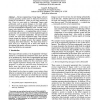42 search results - page 1 / 9 » Reverse Engineering of Legacy Code Exposed |
ICSE
1995
IEEE-ACM
13 years 7 months ago
1995
IEEE-ACM
— Reverse engineering of large legacy software systems generally cannot meet its objectives because it cannot be cost-effective. There are two main reasons for this. First, it is...
WCRE
2002
IEEE
13 years 9 months ago
2002
IEEE
As new computer architectures are developed to exploit large-scale data-level parallelism, techniques are needed to retarget legacy sequential code to these platforms. Sequential ...
RE
2005
Springer
13 years 9 months ago
2005
Springer
A reverse engineering process aims at reconstructing el abstractions from source code. This paper presents a novel reverse engineering methodology for recovering stakeholder goal ...
WCRE
2008
IEEE
13 years 10 months ago
2008
IEEE
Central to any legacy migration project is the translation of the data model. Decisions made here will have strong implications to the rest of the translation. Some legacy languag...
WCRE
2006
IEEE
13 years 10 months ago
2006
IEEE
In this demonstration, we present MELIS (Migration Environment for Legacy Information Systems) an integrated environment for the migration of legacy systems to a multi-tier web-ba...

